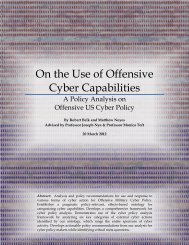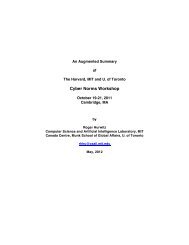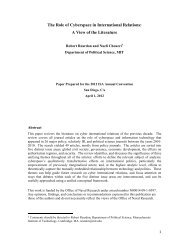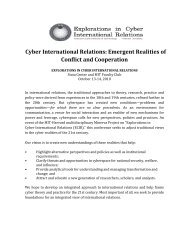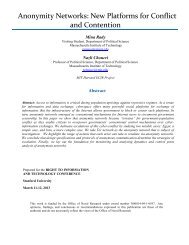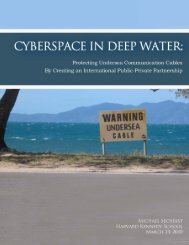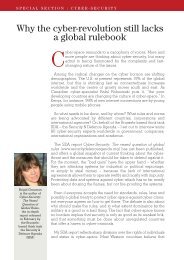Stewardship of Cyberspace: Duties for Internet Service Providers
Stewardship of Cyberspace: Duties for Internet Service Providers
Stewardship of Cyberspace: Duties for Internet Service Providers
Create successful ePaper yourself
Turn your PDF publications into a flip-book with our unique Google optimized e-Paper software.
HATHAWAY/SAVAGE: <strong>Stewardship</strong> <strong>of</strong> <strong>Cyberspace</strong>: <strong>Duties</strong> <strong>for</strong> <strong>Internet</strong> <strong>Service</strong> <strong>Providers</strong> 5<br />
1. Duty to provide reliable and accessible<br />
conduit <strong>for</strong> traffic and services<br />
The <strong>Internet</strong> is a basic, ubiquitous, and essential<br />
communications tool <strong>for</strong> all <strong>of</strong> society. Govern-<br />
ments around the world are adopting policies to<br />
facilitate citizen access to the <strong>Internet</strong> via a fast,<br />
reliable, and af<strong>for</strong>dable In<strong>for</strong>mation Commu-<br />
nications Technology (ICT) infrastructure. This<br />
vision is reflected in the Organisation <strong>for</strong> Eco-<br />
nomic Co-Operation and Development’s (OECD)<br />
<strong>Internet</strong> Economy; Europe’s Digital Agenda; the<br />
United States’s National Broadband Plan; and in<br />
the International Telecommunications Union’s<br />
(ITU) initiatives. 6 Economic progress, citizen<br />
access, and infrastructure quality are measured<br />
in terms <strong>of</strong> price, bandwidth, speed/quality <strong>of</strong><br />
service, skills, content and language, and appli-<br />
cations targeted to low-end users. 7 Progress<br />
is being made and these global initiatives are<br />
bringing faster broadband <strong>Internet</strong> access <strong>for</strong><br />
every citizen to facilitate our in<strong>for</strong>mation society<br />
needs and global e-commerce demands.<br />
For example, Finland passed a law in 2010 legis-<br />
lating that every one <strong>of</strong> its citizens will have the<br />
right to access one megabit per second (Mbps)<br />
broadband connection, obligating twenty-six<br />
telecommunications companies to provide that<br />
quality <strong>of</strong> service. 8 Finland went on to amend<br />
their constitution to make broadband access a<br />
constitutional right. The United Kingdom prom-<br />
ises to have a minimum connection <strong>of</strong> two Mbps<br />
6 The International Telecommunication Union (ITU) is the United<br />
Nations’ specialized agency <strong>for</strong> in<strong>for</strong>mation and communication<br />
technologies.<br />
7 Measuring the In<strong>for</strong>mation Society, 2011 International Telecommunications<br />
Union, Geneva, Switzerland.<br />
8 “1 Mbit <strong>Internet</strong> Access a Universal <strong>Service</strong> in Finland from the<br />
Beginning <strong>of</strong> July,”Press Release, 29 June 2010, Finland Ministry<br />
<strong>of</strong> Transport and Communications, http://www.lvm.fi/web/<br />
en/pressreleases/-/view/1169259.<br />
to all homes by 2012. 9<br />
Government ef<strong>for</strong>ts to provide universal access<br />
at lower cost to consumers have been under-<br />
way <strong>for</strong> decades. Telecommunications liberal-<br />
ization brought the promise <strong>of</strong> global income<br />
gains (economic growth) by making access to<br />
knowledge easier. The General Agreement on<br />
Tariffs and Trade (GATT) Uruguay Round (1986-<br />
1993) began the discussion among nations. It<br />
was further codified in the Marrakech Treaty in<br />
1994, where the General Agreement on Trade in<br />
<strong>Service</strong>s (GATS) principles called <strong>for</strong> the trans-<br />
parency <strong>of</strong>, access to, and use <strong>of</strong> public telecom-<br />
munications transport networks (PTTN) and<br />
services “on reasonable and non-discriminatory<br />
terms.” This included obligations <strong>for</strong> intercon-<br />
nection to PTTN (including private networks) as<br />
well as safeguards <strong>for</strong> public-service responsi-<br />
bilities (duty to warn) and to protect the techni-<br />
cal integrity <strong>of</strong> the network (reliable service).<br />
In 1997, the World Trade Organization (WTO)<br />
adopted a Basic Telecommunications Agreement<br />
(BTA) to liberalize facilities-based international<br />
service and to allow <strong>for</strong>eign entities to own a<br />
majority interest in facilities used to provide<br />
international voice and data service. 10 Examples<br />
<strong>of</strong> the services covered by the agreement include<br />
voice telephony, data transmission, telex, tele-<br />
graph, facsimile, private leased circuit services<br />
(i.e., the sale or lease <strong>of</strong> transmission capacity),<br />
fixed and mobile satellite systems and services,<br />
cellular telephony, mobile data services, paging,<br />
and personal communications systems.<br />
9 “Government Reveals Super-Fast Broadband Plans,” BBC<br />
News, 6 June 2010, http://www.bbc.co.uk/news/technology-11922424.<br />
10 “Report on International Communications Markets 2000 Update,”<br />
prepared <strong>for</strong> Senator Ernest F. Hollings, United States<br />
Senate Committee on Commerce, Science, and Transportation,<br />
Federal Communications Commission, 4 May 2001, 3.



